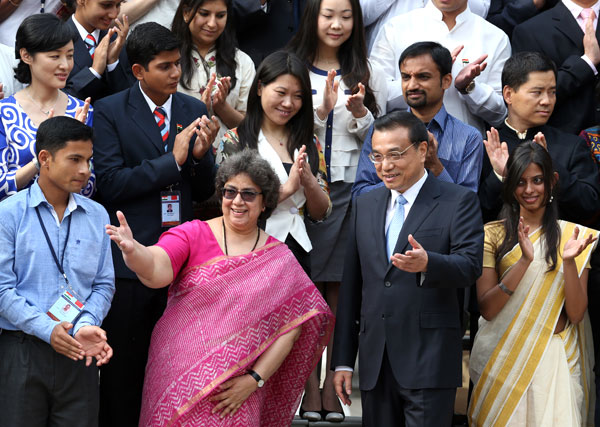Li's visit to India full of hope
- By Rup Narayan Das
 0 Comment(s)
0 Comment(s) Print
Print E-mail China Daily, May 17, 2013
E-mail China Daily, May 17, 2013
|
|
|
Premier Li Keqiang meets a delegation of young people from India headed by Nita Chowdhury, secretary of the Indian Ministry of Youth Affairs and Sports, in Beijing on Wednesday. [China Daily] |
Premier Li Keqiang's May 19-20 visit to India is significant for at least two reasons.
This is his first visit abroad after being elected premier, indicating the importance China, especially Li, attaches to India. Also, Li's visit takes place close on the heels of a successful meeting between President Xi Jinping and Indian Prime Minister Manmohan Singh on the sidelines of the BRICS summit in Durban in March, where the two leaders discussed issues of mutual interest for the first time.
In between, senior diplomats of the two countries have held talks, the most significant being the one during the recent visit of India's External Affairs Minister Salman Khurshid to China. The visit of Khurshid, who has been consistent in his approach to relations with China, prepared the ground for the Chinese premier's visit to New Delhi.
Khurshid has presumably established a good personal chemistry with Chinese leaders, which is essential for diplomatic parleys. The deals the two countries may sign in New Delhi would entail a high degree of mutual sensitivity and space for mutual adjustments, which conforms to oriental wisdom and which should permeate Sino-Indian relations.
Over the years, diplomats and defense personnel of the two countries have benefited from bilateral dealings. And if the two sides are comfortable and enjoy the spirit of bonhomie while dealing with each other, many intractable issues can be smoothened out.
Li's visit to India (as did Khurshid's to China) takes place in the backdrop of the recent standoff between the two countries' armies in the western sector of the undefined and undemarcated Line of Actual Control between India and China in mid-April. But the two neighbors handled the issue deftly and prevented tensions from escalating further, which clearly reflects the maturity of Sino-Indian relationship today.
The fact that such irritants have not stymied the friendly ties between the two countries and their peoples also indicates the resilience of their relationship. But such incidents should neither be trivialized nor ignored. It is likely, therefore, that discussions on the border issue will dominate the talks between Li and his Indian counterpart in New Delhi, even though the two countries have separate mechanisms to deal with the issue.
Media reports suggest that a new set of confidence building measures, which would include border management, could be initiated (and even agreed on) during Li's visit to India. Since these are complex issues, a lot of hard work will be required to fine-tune such agreements. But it is highly likely that the two sides will sign a joint declaration envisioning the road ahead.
Trade will be another important issue in the comprehensive dialogue between China and India in New Delhi. The volume of Sino-Indian trade was more than $73 billion in 2011. And though it fell to $66 billion last year, it is expected to reach $100 billion by 2015. Trade thus plays a significant role in bilateral relations, although the 24 percent drop in Indian exports to China last year has raised concerns in India.
On the security front, positive political vibes between China and India will have a cascading effect on their militaries. Every country has the right to safeguard its sovereignty and territorial integrity in times of threat as well as peace. But a nation's security is more than just defense preparedness; it is also a matter of political trust. As such, it would be unrealistic to burden the two countries' militaries with developing political trust, because that is a job for the political class and diplomats to pursue.
Nevertheless, defense cooperation and military exchanges are always welcome and desirable, because they are like subsets of an over-arching complex and sensitive relationship between the two countries.
As far as media coverage is concerned, it depends to a large extent on the nature of the two countries' relationship. In India, for example, the job of the media is to inform and educate the people and refrain from negative reporting.
The challenge before the two countries' leaderships, defense personnel, diplomats, bureaucrats, media and think tanks - in fact, all the stakeholders - is to maintain the momentum and take bilateral ties to greater heights to help the peoples of the two countries to prosper and promote regional and global peace.
The author is a senior fellow at the Institute for Defence Studies and Analyses, New Delhi. The views in the article are his personal.






